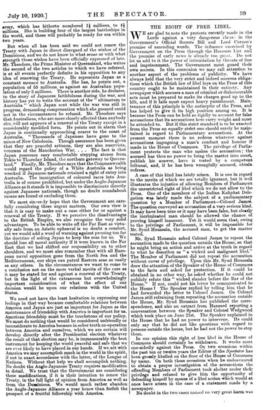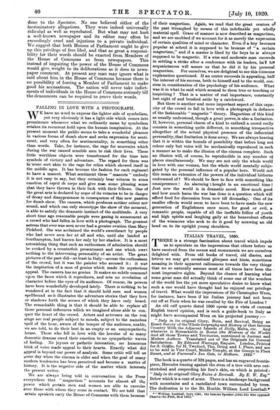THE RIGHT OF FREE LIBEL.
WE are glad to note the protests recently made in the Lords against a very dangerous claus in the Government's Official Secrets Bill and Lord Curzon's promise of amending words. The influence exercised by Government on the Press through the Honours List and the promise of early news is already too great. Do not let us add to it the power of intimidation by threats of fine and imprisonment. The Government must guard their own secrets. In this connexion we may call attention to another aspect of the problems of publicity. We have always held that the very strict and indeed onerous obliga- tions which the British law of libel lays on the Press of this country ought to be maintained in their entirety. Any newspaper which accuses a man of criminal or dishonourable acts must be prepared to make its charges good up to the hilt, and if it fails must expect heavy punishment. Main- tenance of this principle is the antiseptic of the Press, and has helped to give it its high position among M. It is because the Press can be held so rigidly to account for false accusations that its accusations here carry weight and must be attended to. But if this strict standard is to be exacted from the Press an equally strict one should surely be main- tained in regard to Parliamentary accusations. At the present moment there is no redress whatever against accusations impugning a man's conduct and honour if made in the House of Commons. The privilege of Parlia- ment protects the man who makes the accusation ; the accused has thus no power to bring the matter into court, publish his answer, have it tested by a competent tribunal, and, if he has been wrongfully accused, obtain redress.
A case of this kind has lately arisen. It is one in regard to the merits of which we are totally ignorant, but it well illustrates the injustice of allowing Members of Parliament the unrestricted right of libel which we do not allow to the Press. One of the members of the Indian Kaliphat Dele- gation was lately made the subject of a parliamentary question by a Member of Parliament—Colonel James. The question conveyed an accusation of a very serious kind. It may have been true or it may have been false, but clearly the incriminated man should be allowed the chance of proving himself innocent. Yet it would seem that, owing to the privilege of Parliament, it will be impossible for Mr. Syud Houssain, the accused man, to get the matter tested.
Mr. Syud Houssain asked Colonel James to repeat the accusation made in the question outside the House, so that he might bring an action and arrive at the truth in regard to what he describes as "a wicked and malignant libel." The Member of Parliament did not repeat the accusation without cover of privilege. Upon this Mr. Syud Houssain drew the attention of the Speaker of the House of Commons to the facts and asked for protection. If it could be obtained in no other way, he asked whether he could not publicly refute this "wicked slander before the Bar of the House.' If not, could not his letter be communicated to the House ? The Speaker replied by telling him that he had forwarded the letter to Colonel James. On Colonel James still refraining from repeating the accusation outside the HOUB0, Mr. Syud Houssain has published the corre- spondence, and also an extract from Hansard reporting a conversation between the Speaker and Colonel Wedgwood which took place on June 21st. The Speaker explained in the House that he had no power to intervene. He could only say that he did not like questions with regard to persons outside the house, but he had not the power to stop them.
In our opinion this right of free libel in the Howie of Commons should certainly be withdrawn. It works most one-sidedly against the Press. On two occasions within the past ten or twelve years the Editor of the Spectator has been grossly libelled on the floor of the House of Commons by name. On both these occasions when he endeavoured to obtain a proper investigation of the accusations the offending Members of Parliament took shelter under their privilege and refused to give him the opportunity of defending himself by means of a libel action which would at once have arisen in the case of a statement made by a newspaper. No doubt in the two cases named no very great harm was done to the Spectator. No one believed either of the incriminatory allegations. They were indeed universally ridiculed as well as reprobated. But what may not hurt a well-known newspaper and its editor may often be exceedingly cruel and injurious to a private individual. We suggest that both Houses of Parliament ought to give up this privilege of free libel, and that as great a responsi- bility for their words should be exacted from Members of the House of Commons as from newspapers. This instead of impairing the power of the House of Commons would give, weight to its deliberations as it does to news- paper comment. At present any man may ignore what is said about him in the House of Commons because there is no possibility of forcing a Member of Parliament to make good his accusations. The nation will never take indict- ments of individuals in the House of Commons seriously till the denouncers can be required to prove their words.



































 Previous page
Previous page